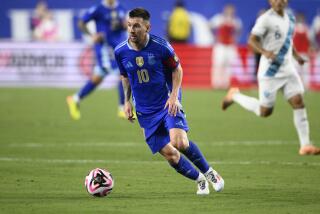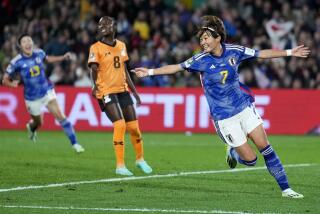Argentina No Longer Written Off
- Share via
ROME — Thirty days and 51 games ago, Argentina opened soccer’s World Cup against Cameroon with a 1-0 loss that appeared at the time, before the Indomitable Lions proved themselves, to be the beginning of the end for the defending champions.
The Argentines were written off in the media and told off by their president, Carlos Menem. Not even the country’s No. 1 citizen, and the world’s No. 1 player, Diego Armando Maradona, came to the team’s defense.
Before the tournament, he said, “Whoever wants the Cup is going to have to snatch it from Maradona.” After the loss in the opener, he said, “The reality is that we are not at the same level as Italy, Brazil and West Germany.”
Yet before an anticipated capacity crowd of 80,667 tonight (11 a.m., PDT) at Rome’s Olympic Stadium, Argentina, having disposed of two of those supposedly dominant teams, Italy and Brazil, will meet the other, West Germany, in a rematch of the 1986 championship game.
Neither is a stranger to the final. The champion in 1978 and 1986, Argentina is playing its third in the last four World Cups. For the West Germans, champions in 1954 and 1974, this is their sixth in the last 10 tournaments and fourth in the last five.
They have lost two in a row, but that has not put so much as a hitch in their swagger. Unlike the Argentines, the unbeaten West Germans have had no doubts from the opening day of the tournament that they again would be a finalist. They enter the game equally confident that they will avenge their 3-2 loss in the final four years ago in Mexico City.
“West Germany is the stronger team, and we intend to prove it,” West German Coach Franz Beckenbauer said Friday.
Argentina’s coach, Carlos Bilardo, who, like Beckenbauer, has announced that this is his final game with the national team, has exhibited considerably less bravado, saying only that his team has a 50-50 chance to win.
Some may find that overly optimistic. Bilardo must replace four players, including three starters, who were disqualified because they received either their second yellow card or a red card for flagrant fouls in the semifinal victory over Italy.
One of those players, forward Claudio Cannigia, is the favorite target of midfielder Maradona’s marvelous passes. Cannigia scored the goals that beat Brazil, 1-0, in the second round and tied Italy, 1-1, to send the match into overtime.
The Argentines eventually won that match on penalty kicks, a result that has not endeared them to a nation of passionate soccer fans. Many of them seemed to believe that it was Italy’s destiny to win the World Cup and were stunned when they discovered otherwise.
Argentina’s ambassador to Italy protested when the country’s flag was stolen from the pole in front of the team’s hotel outside the city in Trigoria. The Argentines later found it ripped to shreds.
Maradona also claimed it was Italian hostility toward the Argentines that created an incident in Rome Thursday, when his brother was arrested for driving the midfielder’s red Ferrari without a license.
After they were upset in the first game by Cameroon, Bilardo was lambasted by President Menem for his defensive starting lineup. The coach responded with five lineup changes for the second game against the Soviet Union. Argentina won, 2-0, but lost its starting goalkeeper, Nery Pumpido, because of a broken leg.
A tie with Romania sent Argentina into the second round as a wild-card third-place team from its first-round group against Brazil. The Argentines won that game despite being badly outplayed and then reached the final by winning their last two games on penalty kicks.
Argentina’s good fortune has been such that Menem now has decided that his presence at the stadium in Milan was the problem in the first game.
Instead of accompanying West German Chancellor Helmut Kohl to today’s game in the Olympic Stadium, Menem will join a worldwide television audience of more than 1 billion viewers. As he has during Argentina’s last five games, the superstitious Menem will watch from his favorite chair in front of his television set in Buenos Aires with Pumpido and former player Jose Luis Brown.
While Argentina has advanced in fits and starts, the West Germans have marched steadily and efficiently along.
They won their first-round group with two victories and a meaningless tie, then beat the Netherlands in the second round and Czechoslovakia in the quarterfinals before finally experiencing a scare.
It was a good one. Their semifinal victory over England came on penalty kicks and raised suspicions that the West Germans peaked too soon.
West Germany has scored 14 goals, nine more than Argentina, but nine of them came in the first two games against Yugoslavia and the United Arab Emirates. In four games since, the West Germans have scored more than one goal only once.
That was during an impressive 2-1 victory over the Netherlands. But they have not looked the same offensively in the last two games.
Indeed, they have not been the same. Striker Rudi Voeller, who scored three goals in the first three games, missed all but 20 minutes of the match against the Dutch because he was sent off with a red card, which disqualified him from the next game against the Czechs. He returned against the English but played less than half an hour because of an injured calf.
Reserve forward Karl Heinz Riedle is not compatible with the other forward, Juergen Klinsmann, who also has scored three goals--but none in the last two games. Klinsmann is thrilled with the news that Voeller is a probable starter today.
Argentina’s goalkeeper, Sergio Javier Goycochea, has become a national hero since replacing Pumpido, giving up only one goal and performing remarkably against penalty kicks.
But the West Germans will provide him with his most severe challenge since he faced Brazil. They attack opponents in waves, beginning with defenders such as sweeper Klaus Augenthaler.
Their coach on the field--the so-called schemer--is midfielder Lothar Matthaeus, 29, an intelligent, creative player who invariably finds the open man and also has scored four goals.
Is he a Maradona? Is Maradona still Maradona?
The answer to those questions could prove the determining factor in the game. Teams that reach the championship game are often so evenly matched that the title goes to the team with a dominant player, such as Brazil’s Pele in 1970, West Germany’s Beckenbauer in 1974 and Maradona in 1986.
Maradona, 29, has not been the same player that he was four years ago, when he scored five goals and assisted on two in the championship tournament. Not only has he not scored in this tournament, he has taken only three shots on goal.
But when Argentina has needed a decisive play, Maradona, despite various injuries and tight, sometimes malicious marking from defenders, has made it.
“Argentina is Maradona and 10 others,” Bilardo said earlier in the tournament.
All over the field on both offense and defense, while leaving his theatrics in the dressing room, Maradona was brilliant in the victory against Italy. Has he saved a truly special performance for this game, the last, he announced Friday, that he will play with the national team?
“Maybe he hasn’t been at his very best here, but he is very good for the team,” Matthaeus said last week. “Maradona is still the best.”
The sports world soon will learn whether the same is true of Argentina.
More to Read
Go beyond the scoreboard
Get the latest on L.A.'s teams in the daily Sports Report newsletter.
You may occasionally receive promotional content from the Los Angeles Times.






